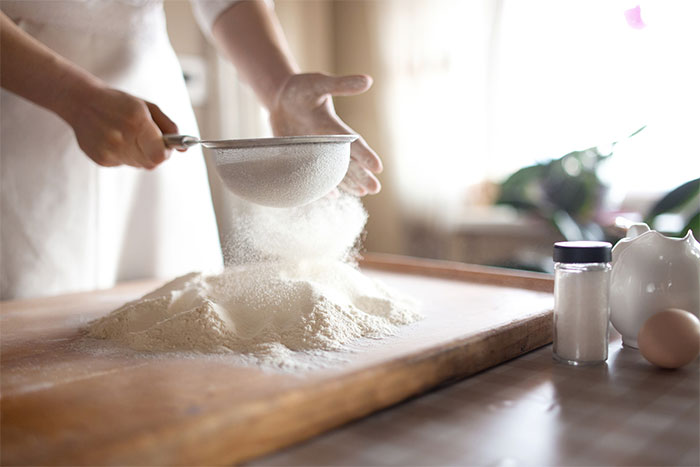With Brits still going gaga for the Great British Bake Off, Lee Graham investigates how you can turn your bakery lines into showstoppers.
The Great British Bake Off (GBBO) may be off to a new channel later this year, but there’s no sign of its popularity crumbling. In fact, before last year’s series, Morrisons appointed a ‘bake officer’ to monitor buying trends resulting from the hit show, while Waitrose reported a 33% rise in sales of salted caramel flavouring after some contestants used salted caramel in their bakes last year.
What’s clear is that if wholesalers and retailers do not cash in on this trend, they risk missing out on their slice of the pie.
Home baking
The home baking market is now worth £946m, so there’s huge potential for sales in the wholesale sector. Jan McKee, executive head of marketing at Dr Oetker UK, says: “Consumers are frequently opting to bake their treats from scratch. The creativity of home baking means trends are hugely relevant in influencing the development of new products. Trends are coming from around the world, as well as being influenced by modern diets.”
Major trends for this year identified by Dr Oetker include ‘maximalism’, perhaps inspired by the elaborate ‘showstoppers’ on GBBO, as well as the popularity of ‘freakshakes’ (milkshakes piled high with cookies and sauces), which originated in Australia.
 Indeed, Dr Oetker’s Fine Cooks Chocolate range has benefited from the indulgence trend, seeing a 22% rise in sales year-on-year. Sales of its cocoa powder also grew 38% in the same period, indicating rising demand for rich chocolate bakes.
Indeed, Dr Oetker’s Fine Cooks Chocolate range has benefited from the indulgence trend, seeing a 22% rise in sales year-on-year. Sales of its cocoa powder also grew 38% in the same period, indicating rising demand for rich chocolate bakes.
McKee says that curiously, ‘maximalism’ co-exists with a separate trend for healthy alternatives: “Sugar replacements such as agave syrup are on the rise, and vegetables including avocado and beetroot are replacing fat. Ingredient-swapping is a great way to create cakes to meet dietary requirements such as gluten-free, vegan or protein boosts for fitness, or simply to produce an unusual flavour and texture for home bakers who want to experiment.
“Raw cacao, both nibs and powder, is up 125% year-on-year, which is another huge trend in health as a replacement for chocolate with nutritional benefits.”
Foodservice
In-store bakery has reported a 10% growth in unit sales of ciabatta, taking it to more than 23m units in the past year, with a sales value of £8.8m. Samantha Winsor, assistant brand manager at Lantmännen Unibake UK, says: “This shows that consumers have changed shopping habits: sales of traditional loaves from in-store bakeries have declined by 9.6%, so shoppers are swapping to premium options, such as ciabatta and speciality breads, and smaller formats such as rolls.
She adds: “Wholesalers should recommend that outlets take note of this trend and ensure that they are stocking plenty of premium bread varieties to satisfy consumer demand.”
A move away from more traditional breads is also noted by Philippa Norton, marketing manager at New York Bakery Co. “With 30% of out-of-home breakfasters eating on the go, breakfast sandwiches continue to be a growing trend,” she says. “Croissants are the second-most popular carrier, but are starting to lose out to carriers that are less messy to eat on the move, such as panini. For this reason, we created a product called the Croll: a hybrid that’s a light pastry, like a croissant, but in the convenient form of a roll. The Croll has already won awards.”
Belgian company Pidy, which specialises in pastry, has also focused on innovation in response to customer demand. “Providing gluten-free bakery products has been a consistent key trend in recent years,” says Robert Whittle, general manager at Pidy UK. “We have taken a lot of time using the latest production methods and technology to achieve an authentic gluten-free pastry. It’s just as delicious as our traditional recipe and is ideal for quiches, tarts, canapés and desserts. This is beneficial for busy establishments that need one product that’s suitable for all guests.”
Wrapped bakery
Wrapped bakery products remain hugely popular in retail, with nearly every household (99.6%) buying them. “Brands continue to dominate, so it’s important that wholesalers encourage retailers to ensure good availability on key lines and clear signposting,” says David Tittensor, category and insights director at Warburtons. “Wrapped white bread in particular continues to be a household staple and Warburtons Toastie loaf remains the number-one wrapped bread product in the UK, with more than 107m units sold in the past 12 months. Warburtons 400g is also the top-selling branded wholemeal loaf.”
Kingsmill, meanwhile, is the country’s fastest-growing bread brand, and has seen 5.3% total market year-on-year growth. “A decline in traditional bread sales has impacted the growth of bakery, but innovation outside sliced bread has proved extremely popular,” says Zoe Taphouse, category director at Allied Bakeries. “Kingsmill Toasties, launched in October, meet the need for more variety and excitement in bakery at breakfast. We estimate the opportunity to be worth £5m in year one, which will add £3.8m incremental value to the category.”
Ed Milner, market strategy and planning director at Hovis, says his brand is the fastest-growing major name in large white loaves. “Hovis Soft White 800g loaf is our top performer, as a direct result of the extensive work conducted last year to improve its quality,” he notes. “Quality – including softness – is one of the key trends at the forefront of the consumer agenda. We know that shoppers are willing to pay more for products that provide good quality and great taste. Wholesalers should therefore ensure they are consistently replenishing their bread aisle and giving prominent space to consumer favourites.”
Viewpoints
 “Gluten-free baking is a huge deal for us. It’s an opportunity to utilise the qualities of alternative ingredients. Our products must all look and taste delicious, regardless of whether they contain dairy or gluten. Many of our most popular cakes are gluten-free and/or vegan. Our most popular item is a salt caramel brownie.”
“Gluten-free baking is a huge deal for us. It’s an opportunity to utilise the qualities of alternative ingredients. Our products must all look and taste delicious, regardless of whether they contain dairy or gluten. Many of our most popular cakes are gluten-free and/or vegan. Our most popular item is a salt caramel brownie.”
Sarah Lemanski, Noisette Bakehouse, Huddersfield
 “We’re seeing a big rise in food-to-go from month to month; probably the biggest rise across the whole store. We’ve started doing Delice de France bread and we get cakes and pies from local suppliers. Morning is the best time of the day: everything flies out the door between 7am and 10am. I’ve been in the trade for seven years, and I’ve watched things go from wrapped bread, bacon and milk at breakfast time to in-store bakery all the way.”
“We’re seeing a big rise in food-to-go from month to month; probably the biggest rise across the whole store. We’ve started doing Delice de France bread and we get cakes and pies from local suppliers. Morning is the best time of the day: everything flies out the door between 7am and 10am. I’ve been in the trade for seven years, and I’ve watched things go from wrapped bread, bacon and milk at breakfast time to in-store bakery all the way.”
Asmat Saleem, Costcutter, Fife
 “We sell bespoke, handmade donuts. Therefore, quality ingredients are imperative. We can’t currently find in wholesale some of the things we need, such as vanilla bean paste and sprinkles with only natural colours, so we source them elsewhere. Fruit is also generally not great quality – for instance, the lemons often aren’t juicy enough – so we get them from local suppliers. As more and more people are starting to care about quality, it’s important that wholesalers keep up.”
“We sell bespoke, handmade donuts. Therefore, quality ingredients are imperative. We can’t currently find in wholesale some of the things we need, such as vanilla bean paste and sprinkles with only natural colours, so we source them elsewhere. Fruit is also generally not great quality – for instance, the lemons often aren’t juicy enough – so we get them from local suppliers. As more and more people are starting to care about quality, it’s important that wholesalers keep up.”
Vicky Graham, Vicky’s Donuts, Hackney, London
 “We recently got in the Warburtons Toastie Pockets – they’re selling well, and we’re going to continue with them. As for our in-store bakery, morning is the big time of day for this – bacon, egg, sausage sandwiches, and so on – and we do okay with wraps and toasties at dinner time, but not as well as at breakfast. We saw more take-up of home bakery when The Great British Bake Off launched a few years back, and that’s stayed level in recent years.”
“We recently got in the Warburtons Toastie Pockets – they’re selling well, and we’re going to continue with them. As for our in-store bakery, morning is the big time of day for this – bacon, egg, sausage sandwiches, and so on – and we do okay with wraps and toasties at dinner time, but not as well as at breakfast. We saw more take-up of home bakery when The Great British Bake Off launched a few years back, and that’s stayed level in recent years.”
John Stevenson, Nisa Local, Stockton-on-Tees








